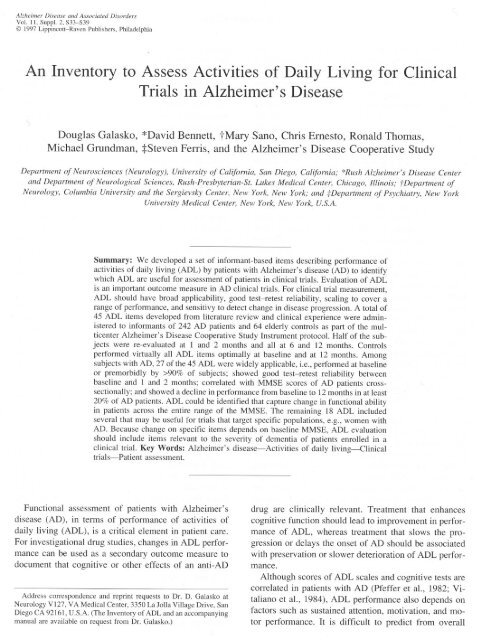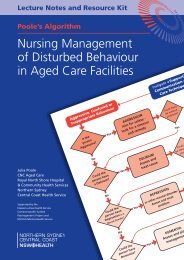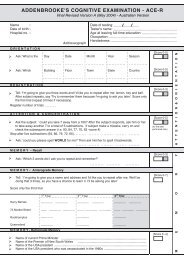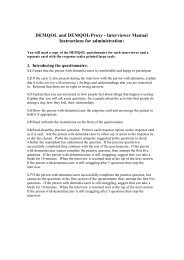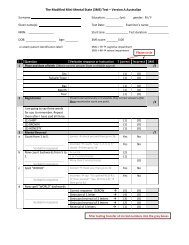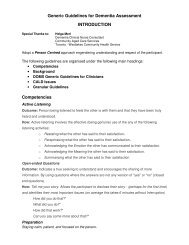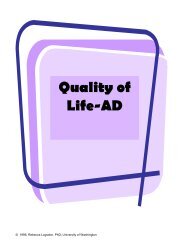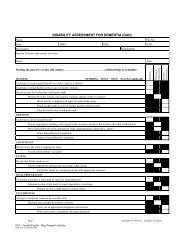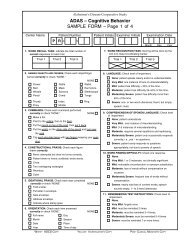ADCS-ADL Scale, Scoring and Manual - Dementia Outcomes ...
ADCS-ADL Scale, Scoring and Manual - Dementia Outcomes ...
ADCS-ADL Scale, Scoring and Manual - Dementia Outcomes ...
You also want an ePaper? Increase the reach of your titles
YUMPU automatically turns print PDFs into web optimized ePapers that Google loves.
Alzheimer Disease <strong>and</strong> Associated Disorders<br />
Vol. 11, Suppl. 2, S33-S39<br />
@ 1997 Lippincott-Raven Publishers, Philadelphia<br />
An Inventory to Assess Activities of Daily Living for Clinical<br />
Trials in Alzheimer's Disease<br />
)<br />
Douglas Galasko, *David Bennett, tMary Sano, Chris Emesto, Ronald Thomas,<br />
Michael Grundman, :j:Steven Ferris, <strong>and</strong> the Alzheimer's Disease Cooperative Study<br />
Department of Neurosciences (Neurology), University of California, San Diego, California; *Rush Alzheimer's Disease Center<br />
<strong>and</strong> Department of Neurological Sciences, Rush-Presbyterian-St. Lukes Medical Center, Chicago, Illinois; tDepartment of<br />
Neurology, Columbia University <strong>and</strong> the Sergievsky Center, New York, New York; <strong>and</strong> :j:Departmentof Psychiatry, New York<br />
University Medical Center, New York, New York, u.S.A.<br />
Summary: We developed a set of infonnant-based items describing perfonnance of<br />
activities of daily living (<strong>ADL</strong>) by patients with Alzheimer's disease (AD) to identify<br />
which <strong>ADL</strong> are useful for assessment of patients in clinical trials. Evaluation of <strong>ADL</strong><br />
is an important outcome measure in AD clinical trials. For clinical trial measurement,<br />
<strong>ADL</strong> should have broad applicability, good test-retest reliability, scaling to cover a<br />
range of perfonnance, <strong>and</strong> sensitivy to detect change in disease progression. A total of<br />
45 <strong>ADL</strong> items developed from literature review <strong>and</strong> clinical experience were administered<br />
to informants of 242 AD patients <strong>and</strong> 64 elderly controls as part of the multicenter<br />
Alzheimer's Disease Cooperative Study Instrument protocol. Half of the subjects<br />
were re-evaluated at 1 <strong>and</strong> 2 months <strong>and</strong> all at 6 <strong>and</strong> 12 months. Controls<br />
performed virtually all <strong>ADL</strong> items optimally at baseline <strong>and</strong> at 12 months. Among<br />
subjects with AD, 27 of the 45 <strong>ADL</strong> were widely applicable, i.e., performed at baseline<br />
or premorbidly by >90% of subjects; showed good test-retest reliability between<br />
baseline <strong>and</strong> 1 <strong>and</strong> 2 months; correlated with MMSE scores of AD patients crosssectionally;<br />
<strong>and</strong> showed a decline in performance from baseline to 12months in at least<br />
20% of AD patients. <strong>ADL</strong> could be identified that capture change in functional ability<br />
in patients across the entire range of the MMSE. The remaining 18 <strong>ADL</strong> included<br />
several that may be useful for trials that target specific populations, e.g., women with<br />
AD. Because change on specific items depends on baseline MMSE, <strong>ADL</strong> evaluation<br />
should include items relevant to the severity of dementia of patients enrolled in a<br />
clinical trial. Key Words: Alzheimer's disease-Activities of daily living-Clinical<br />
trials-Patient assessment.<br />
Functional assessment of patients with Alzheimer's<br />
disease (AD), in terms of performance of activities of<br />
daily living (<strong>ADL</strong>), is a critical element in patient care.<br />
For investigational drug studies, changes in <strong>ADL</strong> performance<br />
can be used as a secondary outcome measure to<br />
document that cognitive or other effects of an anti-AD<br />
Address correspondence <strong>and</strong> reprint requests to Dr. D. Galasko at<br />
Neurology V127, VA Medical Center, 3350 La Jolla Village Drive, San<br />
Diego CA 92161, U.S.A. (The Inventory of <strong>ADL</strong> <strong>and</strong> an accompanying<br />
manual are available on request from Dr. Galasko.)<br />
drug are clinically relevant. Treatment that enhances<br />
cognitive function should lead to improvement in performance<br />
of <strong>ADL</strong>, whereas treatment that slows the progression<br />
or delays the onset of AD should be associated<br />
with preservation or slower deterioration of <strong>ADL</strong> performance.<br />
Although scores of <strong>ADL</strong> scales <strong>and</strong> cognitive tests are<br />
correlated in patients with AD (Pfeffer et aI., 1982; Vitaliano<br />
et aI., 1984), <strong>ADL</strong> performance also depends on<br />
factors such as sustained attention, motivation, <strong>and</strong> motor<br />
performance. It is difficult to predict from overall


